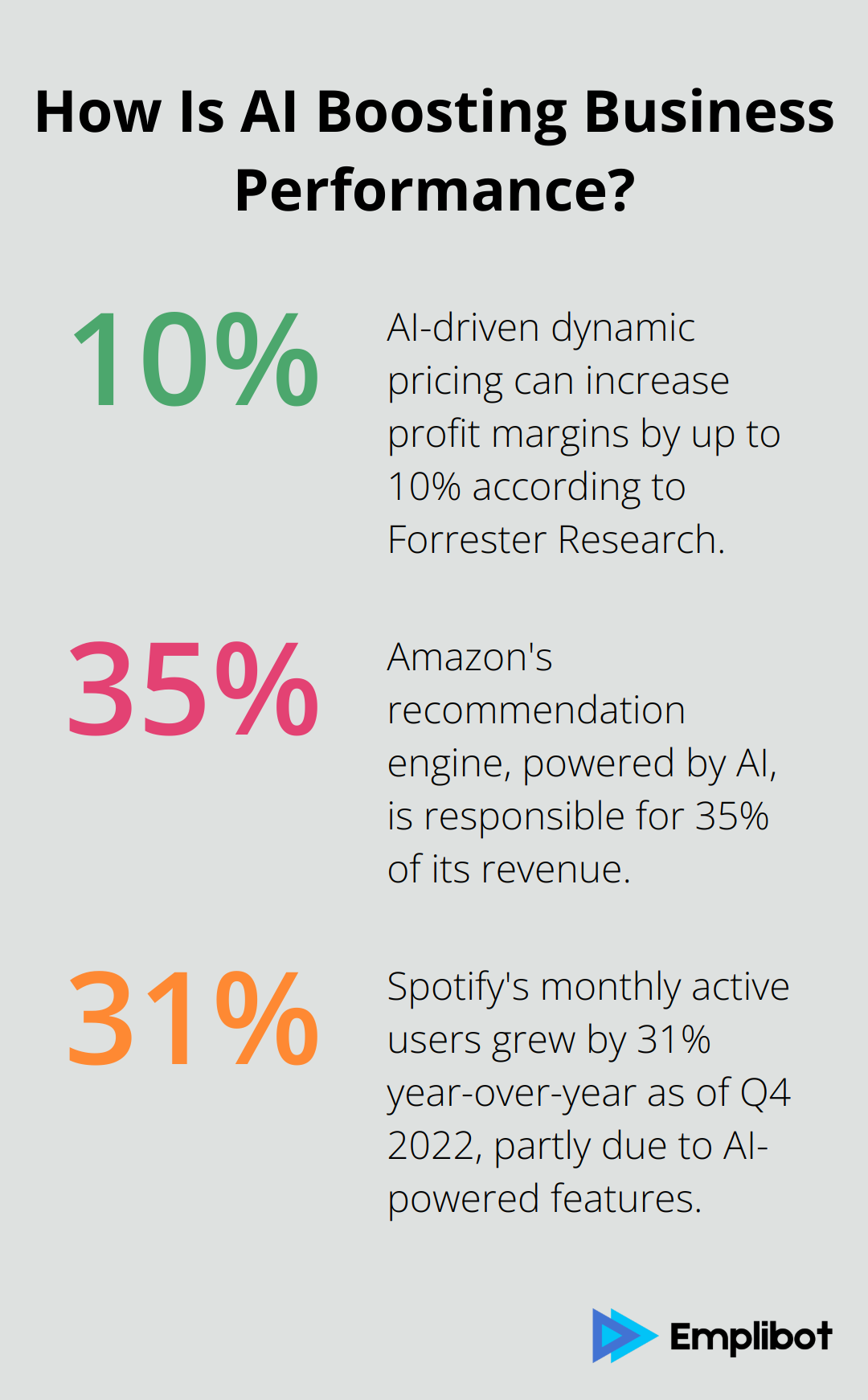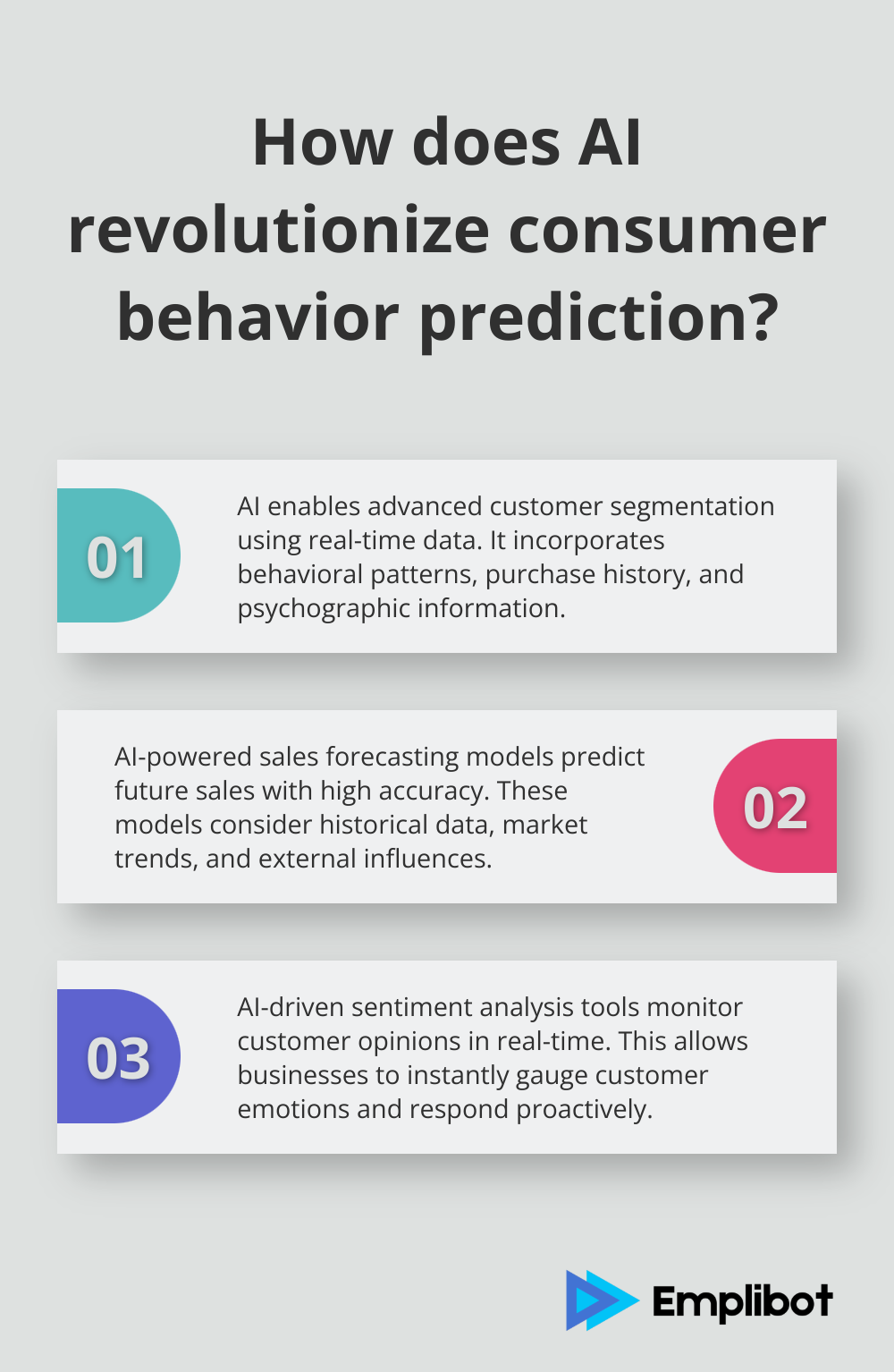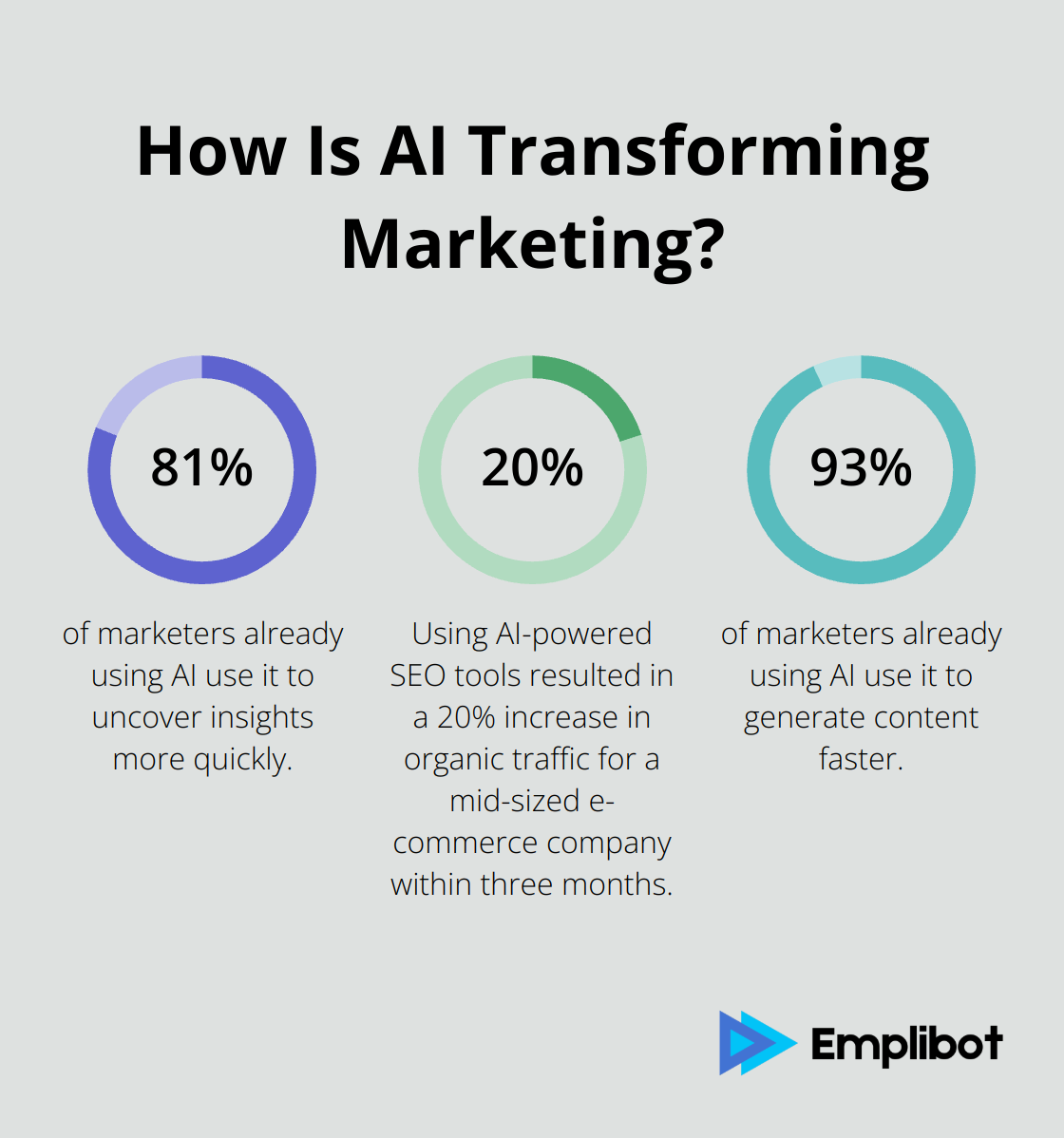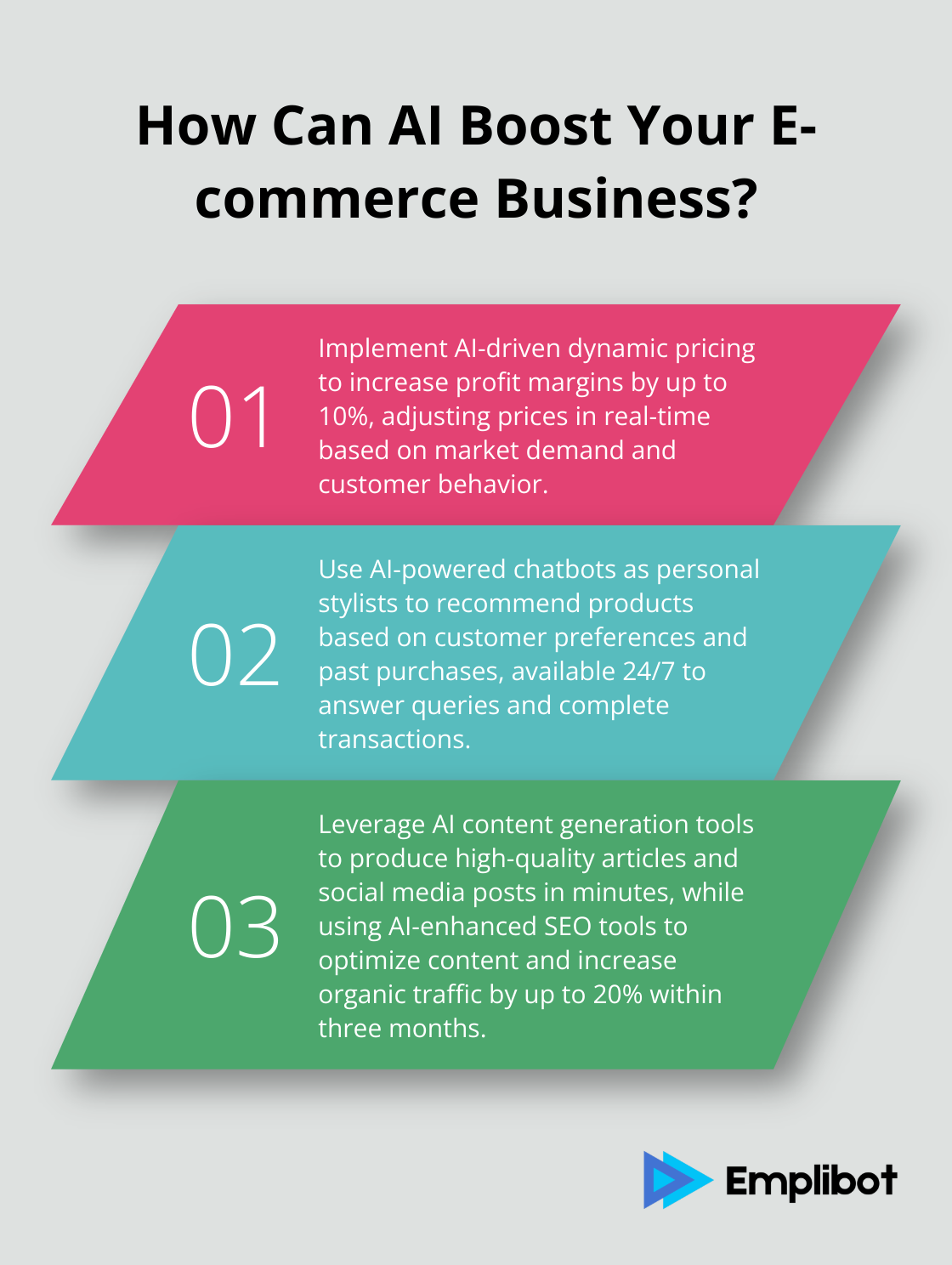At Emplibot, we’re witnessing a seismic shift in marketing strategies driven by artificial intelligence. AI is reshaping how businesses connect with customers, analyze data, and create content.
In this post, we’ll explore how AI will affect marketing and revolutionize personalization, predictive analytics, and content creation. Get ready for a deep dive into the future of marketing, where AI-powered tools are set to redefine industry standards.
Contents
ToggleHow AI Personalizes Marketing
AI transforms marketing personalization, creating tailored experiences that resonate with individual customers. This technology improves marketing outcomes dramatically through various innovative approaches.
Hyper-Targeted Content Creation
AI algorithms analyze vast amounts of customer data to create highly targeted content. Netflix uses AI to generate personalized thumbnail images for movies and TV shows, which has increased click-through rates by up to 30% (according to their tech blog). This level of personalization extends to email marketing, where AI crafts subject lines and content that speak directly to each recipient’s interests and behaviors.
Dynamic Pricing Strategies
AI-based dynamic pricing is reshaping how businesses optimize pricing strategies to maximize profitability and stay aggressive. Amazon exemplifies this approach, using AI to change prices millions of times per day. A study by Forrester Research found that implementing AI-driven dynamic pricing can increase profit margins by up to 10%.
Real-Time Customer Journey Optimization
AI enhances traditional customer journey mapping methods by providing real-time insights and predictive analytics. Spotify’s Discover Weekly playlist (powered by AI) keeps users engaged by serving up personalized music recommendations. This feature has contributed to Spotify’s impressive 31% year-over-year growth in monthly active users as of Q4 2022.
Personalized Product Recommendations
AI algorithms analyze purchase history, browsing behavior, and demographic data to suggest products that align with individual preferences. Amazon’s recommendation engine (responsible for 35% of its revenue) demonstrates the power of AI-driven personalization in e-commerce.
Chatbots and Virtual Assistants
AI-powered chatbots and virtual assistants provide personalized customer support 24/7. These tools can answer queries, offer product recommendations, and even complete transactions. H&M’s chatbot, for example, acts as a personal stylist, recommending outfits based on customer preferences and past purchases.

As AI continues to advance, it will unlock even more sophisticated personalization techniques. The next frontier in AI-powered marketing lies in predictive analytics and consumer behavior insights, which will enable marketers to anticipate customer needs and preferences with unprecedented accuracy.
Predicting Consumer Behavior with AI
AI-powered predictive analytics revolutionizes how marketers understand and anticipate consumer behavior. This technology enables businesses to make data-driven decisions, optimize marketing strategies, and stay ahead of market trends.
Advanced Customer Segmentation
AI-driven models can incorporate real-time behavioral data, social media activity, and purchase history to create dynamic and precise customer segments. These segments go beyond traditional demographics, incorporating behavioral patterns, purchase history, and even psychographic information.
Precision Sales Forecasting
AI-powered sales forecasting models predict future sales with remarkable accuracy. These models consider various factors such as historical data, market trends, and external influences (like weather or economic conditions).
Real-Time Sentiment Analysis
AI-driven sentiment analysis tools monitor and analyze customer opinions across various platforms in real-time. This technology allows businesses to instantly gauge customer emotions and responses, enabling a proactive approach to customer service and brand management.
Personalized Product Recommendations
AI algorithms analyze purchase history, browsing behavior, and demographic data to suggest products that align with individual preferences.
To leverage these AI-powered predictive analytics tools effectively, marketers should:
- Invest in high-quality data collection and management systems to ensure AI models have accurate input.
- Collaborate with data scientists to develop custom AI models tailored to specific business needs.
- Regularly update and refine AI models to maintain accuracy as market conditions change.
- Use AI insights to inform strategic decisions, but always combine them with human expertise and intuition.
- Implement ethical AI practices to protect customer privacy and maintain trust.
As AI technology continues to advance, its role in shaping marketing strategies will only grow more significant. The next frontier in AI-powered marketing lies in content creation and distribution, where AI tools are set to transform how businesses produce and disseminate their marketing messages.

How AI Revolutionizes Content Creation and Distribution
AI transforms content creation and distribution, offering marketers unprecedented efficiency and effectiveness. This technology reshapes the entire content marketing landscape.
AI-Powered Content Generation
AI content generation tools produce high-quality articles, social media posts, and video scripts. GPT-3 based tools can generate blog posts in minutes, saving marketers hours of work. Human oversight remains essential for maintaining brand voice and ensuring accuracy.
93% of marketers already using AI use it to generate content faster, while 81% use it to uncover insights more quickly, and 90% use it for faster decision-making.
Smart Content Distribution
AI algorithms determine the optimal time and platform for content distribution. They analyze user behavior patterns to predict when your audience will most likely engage with your content.

Hootsuite’s AI-powered tool, Best Time to Publish, increased click-through rates by 25% for their users. This demonstrates AI’s power in optimizing content distribution schedules.
AI-Enhanced SEO Strategies
AI revolutionizes SEO practices. Tools like Clearscope and MarketMuse use AI to analyze top-ranking content and provide actionable insights for content optimization. These tools suggest relevant keywords, identify content gaps, and even predict the potential ranking of a piece of content before publication.
A case study by SearchEngineLand showed that using AI-powered SEO tools resulted in a 20% increase in organic traffic for a mid-sized e-commerce company within three months.
Automated Social Media Management
AI-powered tools automate social media posting, engagement, and analytics. These tools (such as Hootsuite Insights and Sprout Social) use machine learning algorithms to optimize post timing, content type, and audience targeting.
Personalized Email Marketing
AI enhances email marketing by personalizing content, subject lines, and send times for individual recipients. Tools like Phrasee use AI to generate and optimize email subject lines, resulting in higher open rates and click-throughs.
AI offers tremendous benefits in content creation and distribution. It’s a tool to enhance human creativity, not replace it. The most effective strategies combine AI efficiency with human insight and creativity.
Final Thoughts
AI will reshape marketing strategies in profound ways. From hyper-personalization to predictive analytics and content creation, AI will empower marketers to connect with audiences more effectively. We anticipate AI will continue to evolve, bringing even more sophisticated capabilities to the marketing landscape.

As AI transforms marketing, businesses must adapt to stay competitive. This means investing in AI technologies, upskilling teams, and fostering a culture of innovation. It’s important to strike a balance between leveraging AI’s capabilities and maintaining the human touch that’s essential in building authentic connections with customers.
AI will affect marketing by leading to more personalized, efficient, and effective strategies. However, AI is a tool to enhance human creativity and decision-making, not replace it. The most successful marketers will harness AI’s power while infusing their strategies with human insight and empathy.










 Rated Excellent 4.5
Rated Excellent 4.5